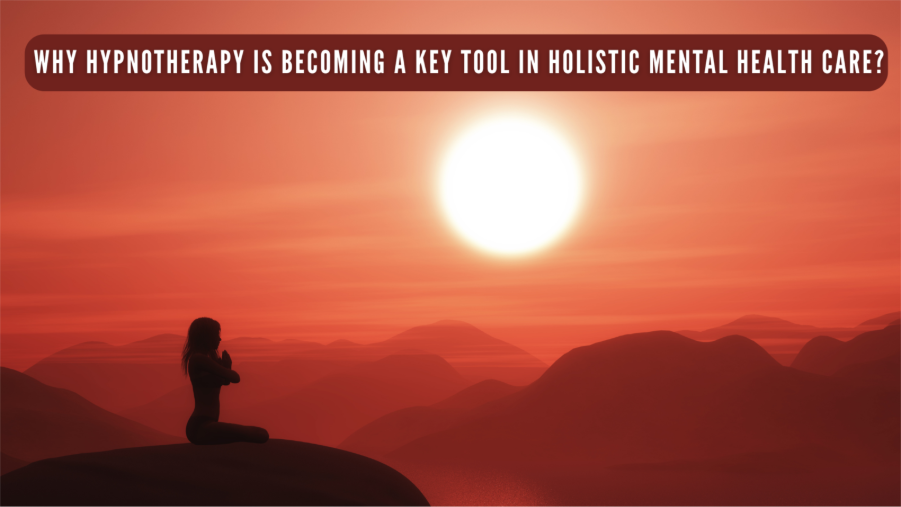
Throughout Australia, individuals are exploring mental health care options that do not just focus on managing symptoms but follow an individualistic approach and care.
This type of treatment, commonly referred to as holistic mental health care, may entail a combination of therapeutic methods, lifestyle practices, and self-care strategies. The purpose is to promote mental, emotional, and physical wellbeing in a manner that reflects the unique needs and circumstances of individuals.
In this field, hypnotherapy is gaining some silent attention.
Contrary to the stage-show image that it occasionally carries, modern hypnotherapy is a guided process that may assist individuals to focus their thoughts, enter into a relaxed state, and explore their thinking or behaviour patterns.
Although it cannot be used as an alternative to other mental health support, it can be a part of a larger, personalised care plan.
Here are a few ways hypnotherapy can help in holistic mental health care.
1. May Support the Mind–Body Connection

Holistic methods usually consider the mind and body as interconnected. As an example, stress may cause muscular tension, and physical discomfort can affect mood.
Considering that, hypnotherapy sessions may involve breathing exercises, imagery and relaxation techniques that might help alleviate physical tension as well as foster mental relaxation. This subtle change in physical and mental conditions can serve as a basis to build other wellness practices, such as yoga, mindfulness meditation, or gentle movement.
In this way, hypnotherapy may be part of a group of activities that acknowledge the two-way relationship between the body and the mind.
2. May Assist with Emotional Regulation and Stress
Reducing stress is the most widespread goal of individuals seeking mental health support. In this context, guided hypnotherapy can offer a space to pause, reflect and practice a calming response to a stressful situation.
One of the Australian mixed-methods studies published in the MDPI journal (2022) focused on the perceptions of hypnotherapy in the workplace mental health programs. Participants perceived it as a possible method of reducing anxiety and stress in some areas, especially when combined with more general wellbeing plans.
Although the experience can be different, the process may promote a more gradual approach and deeper breathing, along with a more methodical reaction to difficulties, all of which can also be found in other therapeutic and self-care techniques.
Instead of targeting the eradication of stress, hypnotherapy, as a holistic process, targets the acquisition of skills that can be used to manage stress.
3. Might Increase Self-Awareness for Behavioural Change
Holistic care is an option that many people choose when they need to change habits that are no longer beneficial to them, be it in sleeping patterns, eating, or concentration. That being the case, hypnotherapy can provide a systematic method of exploring these behaviours at a deeper level.
By working with focused attention, people may uncover the thoughts or feelings attached to particular behaviours. This awareness, in some circumstances, may be complementary to other approaches, including cognitive-behavioural therapy, lifestyle coaching or mindfulness training. Although hypnotherapy in itself is not a one-stop solution, it can be a part of a larger initiative to help facilitate the process of changing a habit slowly and permanently.
4. Can Complement Other Therapies
Holistic mental health care is rarely a single-method approach. A large number of individuals use a combination of self-directed activities and professional therapies to design a unique plan.
Hypnotherapy may be combined with counselling, cognitive behavioural therapy, mindfulness, or even with physical practices like Pilates or walking, since it could promote a relaxed and attentive state. However, it is not meant to substitute all other forms of treatment, but can be a practice that accompanies the treatment objectives established with other practitioners.
5. Offer Flexibility in Approach
Flexibility is a key part of holistic care, as everyone’s mental health journey is different. That being said, hypnotherapy can be adapted to focus on specific areas such as preparing for a challenging event, exploring self-confidence, or developing relaxation skills.
Sessions may vary in length, frequency, and structure, allowing them to fit alongside other wellbeing activities. This adaptability can make hypnotherapy a manageable addition to a balanced lifestyle plan without requiring significant changes to existing routines.
6. Might Encourage Ongoing Self-Care
Many people find that self-care practices, when used consistently, help maintain mental and emotional wellbeing.
Similarly, hypnotherapy may encourage ongoing self-care by offering tools and techniques—such as visualisation or calming breathwork—that can be used outside of formal sessions. When practised regularly, these strategies might become part of a personal toolkit for navigating everyday pressures.
In holistic care, having a variety of tools available means there are more options to draw upon when challenges arise.
Key Factors That Might Shape Your Experience
Hypnotherapy may not be suitable for everyone, and outcomes can vary. It should always be discussed with a qualified health practitioner, especially for those with existing mental health conditions.
In Australia, hypnotherapists are not regulated under a single national body, so choosing a practitioner who is professionally trained, insured, and a member of a reputable association can help ensure ethical and safe practice.
It’s also worth noting that hypnotherapy is not designed to replace medical or psychological treatment. Instead, it can be considered as one of several strategies in a wider mental health and wellbeing plan.
Final Thoughts
Holistic mental health care recognises that wellbeing is influenced by many interconnected factors—emotional, physical, social, and lifestyle-related. Hypnotherapy may find its place in this approach by supporting relaxation, increasing self-awareness, and complementing other therapies.
While it is not a stand-alone solution, it can offer another pathway for those interested in a whole-person approach. When explored with realistic expectations and guidance from qualified professionals, hypnotherapy might be a valuable part of a flexible, individualised wellbeing plan—one that respects each person’s unique journey towards balance and self-care.







